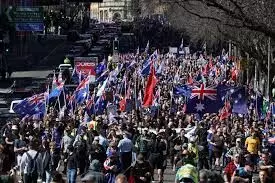Thousands March in Australia Against Immigration, Indians Singled Out
Thousands joined anti-immigration rallies in Australia, singling out Indians whose population doubled in 10 years, sparking political condemnation.
Protesters carrying Australian flags during the "March for Australia" anti-immigration rally in Sydney.

On Sunday, thousands of Australians demonstrated against mass immigration in major cities like Sydney, Melbourne, and Canberra. Known as the "March for Australia," the protests garnered attention for specifically targeting Indian migrants, whose numbers have more than doubled in the last ten years.
The number of Indian-born people living in Australia increased from approximately 422,000 in 2013 to almost 845,800 in 2023, accounting for more than 3% of the total population, according to census data. The rally's flyers, which asserted that migration was leading to "cultural replacement," drew harsh criticism.
Large-scale demonstrations and altercations
In Sydney, hundreds of people joined a counter-rally organised by the Refugee Action Coalition, while 5,000 to 8,000 people gathered near the marathon course, draped in national flags. Hundreds of police officers were deployed, and there was little to no violence at the end of the event.
Before marching to parliament in Melbourne, demonstrators gathered outside the Flinders Street station. Police clashed with counter-demonstrators after neo-Nazi leader Thomas Sewell's speech heightened tensions. An estimated 5,000 people participated, two officers were hurt, and six arrests were reported by the police.
One Nation leader Pauline Hanson, Senator Malcolm Roberts, and federal MP Bob Katter were among the several hundred people who gathered in the vicinity of Parliament House in Canberra. In Queensland, there were also smaller rallies.
Political reaction
All political parties denounced the rallies.
- "This rally is about spreading hate, which is being encouraged by neo-Nazi groups," said Federal Labour Minister Murray Watt.
- "There is no place in our country for those who seek to divide us," said Home Affairs Minister Tony Burke.
- "This far-right activism has no place in modern Australia," said Dr. Anne Aly, Minister of Multicultural Affairs.
- "Diversity is Australia's strength, not a threat," said Cassandra Goldie, CEO of the Australian Council of Social Services.
- Even opposition leaders voiced their worries. Federal Opposition Leader Sussan Ley wrote on social media: "Racism, violence, and intimidation have no place here." Julian Leeser, the shadow attorney general, issued a warning about "anti-Indian sentiment and antisemitic undertones" during the rallies.
Rising far-right concerns
Australia, where nearly 50% of residents are either born overseas or have at least one parent born abroad, has witnessed a surge in far-right activity in recent years. In response, new laws introduced in 2024 ban Nazi salutes and extremist symbols, with violations carrying mandatory prison terms.

